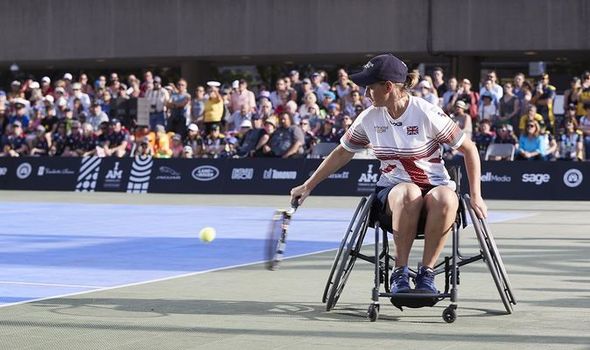Wounded veteran, Cornelia Oosthuizen who lives in Roehampton where she is pursuing her career as a full time wheelchair tennis player, is urging others to step up to raise vital funds for wounded and sick veterans, having used exercise herself to overcome her own mental and physical health challenges following an injury that led to her having her lower leg amputated.
Cornelia, 41, reveals that learning to walk again was the biggest step she has ever had to take in her recovery – as she encourages people across the UK to step up to help injured veterans like them get the support they need.
She hopes to motivate people to sign up to Help for Heroes’ new challenge, Step 2 It, to do up to 10,000 steps a day and, in so doing, experience the benefits that exercise has given him in boosting his mental wellbeing.
A former British Army officer, Cornelia had her lower leg amputated after five years of living in agony following an injury sustained while competing in the Army’s annual tennis competition in 2014. Eventually diagnosed with Complex Regional Pain Syndrome (CRPS) which is characterised by intolerable long term pain, Cornelia’s amputation in 2018 took place as a last ditch effort to stop the pain and she then underwent intense rehab and physiotherapy to learn to walk again. She has since won a gold and bronze medal at the 2017 Invictus Games as a wheelchair tennis player and has her sights set on representing her country at the Tokyo Paralympics.
She says, “My quality of life deteriorated as the chronic pain intensified and I ended up being a shadow of my former self.When I became a single leg amputee I then struggled to accept that for a long time, but this was also the beginning of accepting the new reality and sport for me was an absolute gift from Help for Heroes. For those who get involved in Step 2 It I would like to say thank you, and can honestly say that doing physical exercise definitely helps with your mental health. Let’s do this, man, and don’t hold back.”
Research* carried out by Help for Heroes among wounded, injured and sick veterans, serving personnel and families reveals that 56% of this group are doing less exercise than normal since the COVID-19 pandemic began, with 39% saying that they don’t feel motivated to exercise. This is despite the fact that 65% of respondents find exercise is something they can use to manage stress and anxiety. Other reasons given for not exercising as much include having to self-isolate (29%), worries over catching the coronavirus (13%), having no/less free time (10%) and having to look after children/partner at home (10%).
Step 2 It asks participants to sign up at Step2It.helpforheroes.org.uk and do 10,000 steps a day (or a distance of their choice) for 30 days, getting sponsors to support their challenge. With the majority of its fundraising events being cancelled due to the coronavirus pandemic, Help for Heroes hopes that Step 2 It will start plugging its fundraising deficit while giving people an opportunity to get fit in a fun way.
Hannah Lawton, Sports Recovery Manager at Help for Heroes, says,” Sport and exercise are massively important for many of the sick and wounded veterans that we support. Not just to help their physical wellbeing but to improve mental health. It can be a great way to re-motivate yourself after injury or illness and help you realise you can still do the things you love.”
Over the past few months, many people have found solace in exercising and keeping fit. But like many of our veterans, there are also those who have felt demotivated because of concerns and worries caused by the coronavirus, even though we all know that exercise makes us feel better. Our hope is that Step 2 It will give anyone and everyone across the UK a goal to work to – either to motivate them to get back into exercise, or a reason to keep up new habits formed. By taking this big step for themselves, they won’t just be helping veterans like Cornelia, Rob, Rachel and John, but will be doing themselves a favour too.”
*About the Help for Heroes Research: * Based on 312 responses to a survey carried out by Help for Heroes in May 2020 of wounded, injured and sick veterans, serving personnel and families who answered questions around the amount of exercise they had undertaken since the COVID-19 pandemic began to understand how their support needs may have changed.
